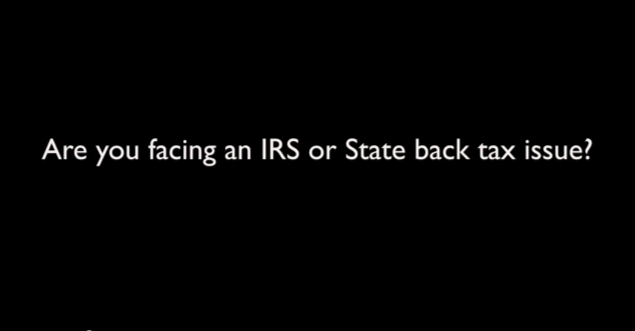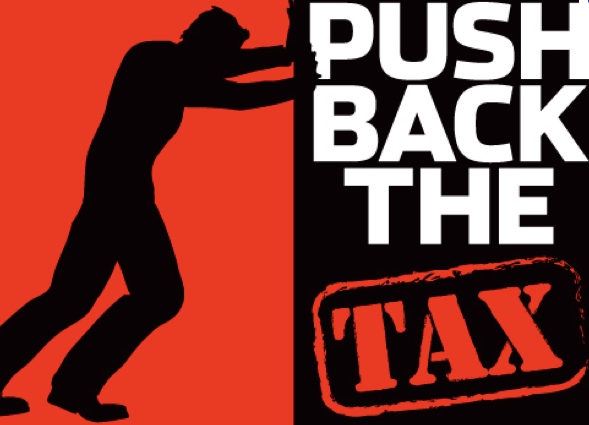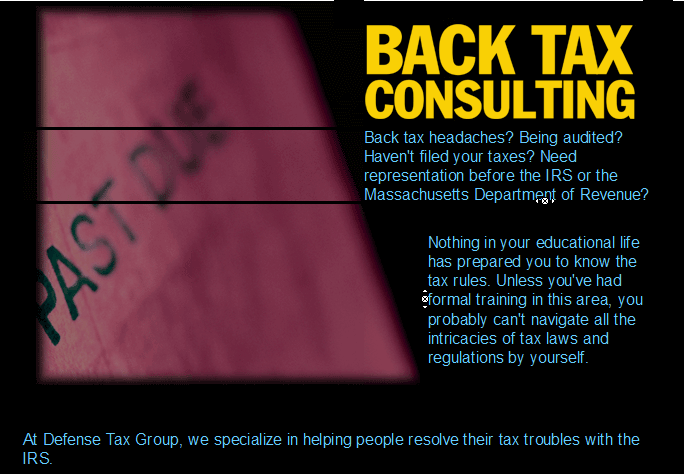Get IRS Tax Relief Help
IRS Tax Relief Options
To start the process, fill out our contact form on the website. Our IRS tax attorneys will get to work almost immediately to get you the IRS tax relief you need. If you are worried that the costs of expert federal tax relief help will be too much, we offer affordable financing to help our clients get the help they need.
Suggested Read: Some Important Facts You Should Know About the IRS
Getting started is easy and our affordable payment plans are designed to fit your budget. We are able to provide underwriting in 24 hours, in most cases. As soon as you make your initial deposit, our tax relief attorneys will get to work on your case almost immediately to save you thousands and leave your irs tax problem in the past.
How to effectively deal with IRS Back Taxes?
To seek the most appropriate answers for the most sought-after IRS Back taxes related queries, numerous taxpayers usually fall for the Offer in Compromise (OIC) program as a result of all those late-night TV commercials which claim to settle all of your back tax debt for pennies.
Now, who would refuse the chance to settle their IRS Back tax debt ‘for pennies’, though most of us are unaware of the fact that while an OIC program might work for some, it really and quite certainly won’t work for all.
Now the positive news, for those looking into settling their IRS Back Tax debt, is that the IRS has many other available options to do the same.
The article attempts to explain the most appropriate taxpayer’s options, their advantages as well as the pros & cons of each of the methods listed below:
The various Taxpayers’ Options:
1). IRS Installment Agreement:
Now quite surprisingly, only a few taxpayers actually think about opting for an installment agreement to settle their back taxes debt, as in our opinion, the installment agreement request is often the finest option for various reasons. As the IRS considers a taxpayer who has particularly opted for an installment agreement as a compliant, it very much lowers the amount as well as the frequency of IRS phone calls and letters in the short-term, while it clearly reflects a taxpayer’s good intentions for long-term cooperation.
When to use this?
The most appropriate way to answer this question is to prepare a list of reasons for why an installment agreement is not required, which is when you have a far better option. For e.g., if a large balance is owed by any taxpayer to the IRS and he/she could only afford minimal installment payments, in that case, a different option would be better desirable as the taxpayer would be barely paying off their debt principal. Now, this doesn’t at all mean that the Installment Agreement is lesser desirable. The fact remains the same that the Installment Agreement is quite significant and can always be considered even as an interim solution only, while you’re considering other methods.
Related Read: How do I apply for an Installment Agreement?
The Pros:
- Flexibility.
- Makes IRS content.
- Prevents further collective IRS action.
- All time availability.
The Cons:
- Interests keep on accumulating.
- Might take a longer period to pay off the debt.
- Always have to keep the track of payments.
2). File/Amend Past Tax Returns:
The other way to lower tax debt which quite often gets unnoticed is to file an amended tax return or to file a return, after the deadline when none of the returns were ever filed. Now sometimes a taxpayer is able to reduce his/her liability by amending their tax returns, in case if on their original return, their liabilities were overstated. Likewise, if any taxpayer is unable to file his/her tax return, the IRS might file a substitute for their return that would provide the taxpayer the minimal deductions and the necessary exemptions.
When to use Installment Agreement?
To file an amended or an original return is one more option that the taxpayer should always consider if he/she badly wishes a direct reduction in liability. Especially, in those cases when their liabilities are overstated because of either an error by the tax preparer or an IRS substitute for return, specifically for filers of Schedule C category. One more example where filing a late return is advantageous, is when a taxpayer receives a tax refund that was withheld during that particular year or due to any particular credit. But, there is also a 3 year limitation law for any refund claim and which in turn is applicable against the balance that the taxpayer actually owes to the IRS.
The Pros:
- Decrease of tax liability.
- Reducing the chances of potential penalty as well as interest.
The Cons:
- Acquires the tax code information.
- Issues of the statute of limitations.
3). Offer in Compromise (OIC):
As noted earlier, the offer in compromise option is the much-publicized resolution method which receives the maximum attention. And it could provide the best possible solutions to any taxpayer with back taxes debt but only when the circumstances are in accordance.
When to use Offer in Compromise (OIC)? Now the offer in compromise (OIC) program actually works just like a weighing scale which tries to balance the liability of the taxpayer which he/she owes to the IRS against their expenses, income, equity and assets. And though there isn’t any thumb rule for the same, usually a taxpayer with a higher liability and a lower paying ability is considered a better candidate for the OIC program. Also, an interested OIC candidate should not have any felonious returns, should have prepared each and every estimated tax deposits as well as payments and of course, should not be bankrupt.
The Pros:
- Lowers the debt of the taxpayer through settlement.
- Suspension of many collection actions.
- Retention of certain assets.
The Cons:
- Taxpayer has to deposit higher initial payments.
- Strict measures against noncompliance during, before and 5 years after the OIC program.
- Might require by the taxpayer to liquidate his/her assets.
- Might take some years to finish.
4). IRS Collection Procedures for Taxpayers Filing and/or Paying Late:
Now the IRS limitations act for the back taxes collection is usually ten years after it has prepared an assessment of a particular tax liability. This also means that IRS acquires a ten year window access to collect back taxes and once that access window shuts, the IRS can’t make any legal claim towards these back taxes.
Now this particular method might sound great, but this is not a valid option as the IRS is still legally entitled to initiate collection action by virtue of a tax levy or/and lien. A tax lien is a claim towards the property of the taxpayer which is being used as security against the debt of the taxpayer and a tax levy is the legal possession of the property of the taxpayer to cover the back tax debt.
Another significant aspect is to continuously check and prevent triggering of the various exceptions to the period of the statute of limitations that might result in the extension of the 10 year period. Now the various exceptions include the filing of the tax return after the deadline date, opting for an OIC as well as declaration of bankruptcy.
Some actions the IRS might take to collect taxes include:
- Serving a Notice of Levy
- Filing a Notice of Federal Tax Lien
The IRS also may use a levy to collect taxes. The IRS might levy assets like retirement income, Social Security benefits, bank accounts, and wages. The IRS might also seize your property for the purpose of selling the property to satisfy a tax debt including your car, boat, or real estate. Moreover, any state income tax refunds or future federal tax refunds that you’re owed, may be applied to your federal tax liability.
When to use IRS Collection Procedure? Now, this option is not recommended unless the taxpayer’s circumstances are quite severe like if a taxpayer doesn’t own any property (which might include wages) on which the IRS could attach a levy or lien.
The Pros:
- Can wipe out the back taxes debt of the taxpayer.
The Cons:
- Excellent opportunity for the IRS to attach a levy or/and lien on the property of the taxpayer.
- Wait for a longer period.
- Unknowingly trigger an exception which might result in an extension of 10 yrs period.
To know more about IRS TAX RELIEF – TIPS FOR TAXPAYERS – TAX RELIEF PROGRAMS & MUCH MORE.
DOWNLOAD FREE PDF(below)
Defense Tax Partners offers IRS tax debt help to quickly and efficiently solve your tax problems. Looming tax debt, threatening letters, wage garnishments, tax levies or tax liens leave families financially devastated and unable to pay bills. Hesitating to get IRS tax help can result in the IRS attaching your wages, levying your bank account or taking possession of your property for auction.
Representation from IRS tax attorney is necessary for IRS tax relief. We can negotiate with the IRS to settle your tax debt, often for much less than the full amount owed. We will work with you to find solutions and negotiate with the IRS for abatement of penalties and taxes, to stop wage garnishment or bank levies and to find a resolution to settle your tax debt.







